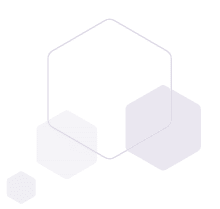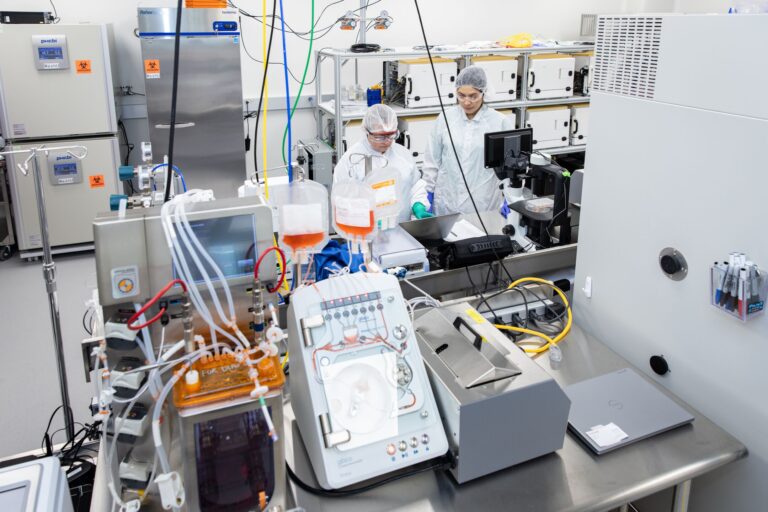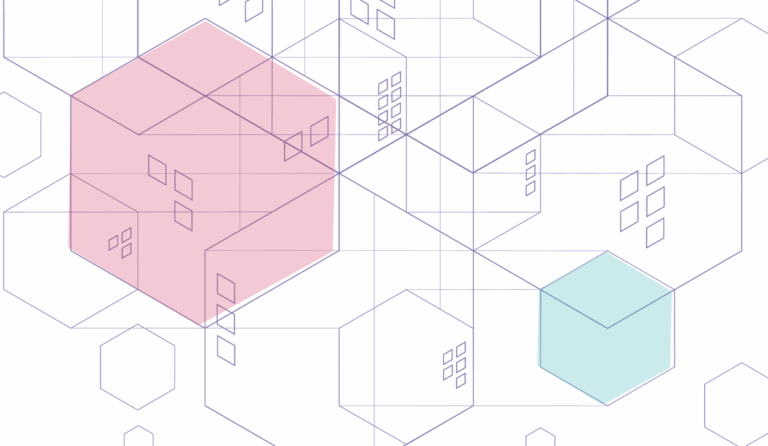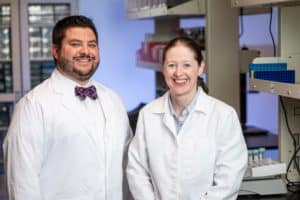
A.J. Mellott remembers exactly when the idea for growing cells in a micro-channeled hydrogel hit him. He was a graduate student, and he was working endlessly to grow cell cultures for research.
“We grow tons of cells in 2D with the goal to ultimately get to 3D structures and later to animal models.” he recalled thinking during one of those seven-day workweeks. “Why don’t we just start with 3D?”
He began kicking around ideas with Heather Decker, a microscopist by training and 3D printing enthusiast. Eventually, Decker helped design, program, and build a prototype, making Mellott’s idea a reality. They created Ronawk and Bio-Blocks, a cell culture platform that eliminates the need for subcultures. The goal of the company is to accelerate cell culture technology.
Mellott and Decker started Ronawk in 2019. He’s CEO, and she’s CTO. They joined BioFabUSA in 2019. Ever since then the company has been expanding fast with customers, staff, and new product developments. Bio-Blocks are now used to grow cells in labs all over the world.
Ronawk currently offers three families of the one-cubic-centimeter Bio-Block, with more planned.
- The T-Block is ideal for physiological modeling, such as growing tissue or spheroids.
- The X-Block is perfect for massive cell growth in a small area. These Blocks are dissolvable with a proprietary reagent for downstream applications such as RNAseq, qPCR, PCR, etc.
- The E-Block is for harvesting cellular byproducts, such as exosomes, protein, and extracellular vesicles. These Blocks are producing mg/mL on par with larger growth environments.
The blocks mimic jigsaw puzzle pieces and are made from proprietary materials. The jigsaw puzzle piece design allows a culture to be expandable. This is a big advantage allowing scientists to do research in the Bio-Blocks and stay with the same substrate throughout trials.
“An important benefit is the Blocks eliminate subcultures,” said Scott Leigh, Ronawk’s chief revenue officer. “This is allowing the cells to stay more consistent. The cell culture techs love it and it makes this the perfect substrate for a streamlined and simple cell culture process. By eliminating subcultures, we drive down the cost, increase efficiency, minimize contamination issues, and provide consistency in research.
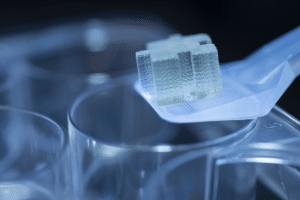
“From a scientist’s standpoint, the cells are retaining phenotype considerably longer and there’s a significant decrease in senescence,” Leigh said. “With drug development, therapies, life sciences, agricultural research, wound healing, cultured meat, or anything else done with cell culture, a scientist wants to be able to start and finish with as much consistency as possible.”
That’s where BioFabUSA, a program of the Advanced Regenerative Manufacturing Institute, comes in to help Ronawk accelerate research for scientists and engage in partnerships with others working to advance the emerging field of biofabrication.
Ronawk’s BioFabUSA membership has opened several conversations in that direction, Leigh said.
It is a safe bet that other BioFabUSA members will find great value in what can be seen as a closed system offered by Ronawk. That’s because it complements the working demonstration system of SMAC—for Scalable, Modular, Automated and Closed—manufacturing that BioFabUSA built.
If all these advantages of Ronawk’s Blocks aren’t convincing enough, Leigh has one more card to play: sustainability. “We can source all our materials locally.”
Researchers can’t get enough cells fast enough for their work. The bioeconomy is beset with labor shortages. And the COVID-19 pandemic upset supply chains for raw materials, a lot of which are made in East Asia. Considering all of that, it’s possible Ronawk will be swept up in the reshoring movement taking place in North American manufacturing.
“Everybody needs to find smaller, more efficient models,” Leigh said. “And if any of our initial customers are an indication, the Bio-Blocks are providing more for less by eliminating subcultures.”
